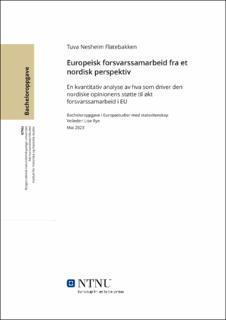| dc.contributor.advisor | Rye, Lise | |
| dc.contributor.author | Flatebakken, Tuva Nesheim | |
| dc.date.accessioned | 2023-09-12T17:20:24Z | |
| dc.date.available | 2023-09-12T17:20:24Z | |
| dc.date.issued | 2023 | |
| dc.identifier | no.ntnu:inspera:145530834:64848051 | |
| dc.identifier.uri | https://hdl.handle.net/11250/3088977 | |
| dc.description.abstract | Eksterne kriser og økt usikkerhet i det europeiske sikkerhetslandskapet har de siste årene bidratt til en styrking av sikkerhets- og forsvarssamarbeidet gjennom Den europeiske union (EU). I etterkant av den russiske invasjonen av Ukraina i februar 2022,
har de nordiske EU-statene dessuten gjennomgått sikkerhetspolitiske retningsskifter gjennom den danske opphevelsen av forsvarsforbeholdet, og Sverige og Finlands brudd med den tradisjonelle alliansefrihets-politikken gjennom sine søknader om medlemskap i The North Atlantic Treaty Organization (NATO). Dette gir muligheter for tettere europeisk sikkerhetssamarbeid i Norden. Samtidig aktualiseres opinionens holdninger, da støtte i opinionen har betydning for den europeiske sikkerhetspolitikkens legitimitet og videre utvikling. Denne oppgaven skal derfor undersøke hvilke faktorer som bidrar til støtte til økt forsvarssamarbeid i EU, med et fokus på opinionen i de nordiske medlemsstatene. Oppgaven undersøker også hvorvidt opinionen i de nordiske medlemsstatene er mer skeptiske til denne formen for integrasjon sammenlignet med opinionen i resten av EU. Undersøkelsen gjennomføres ved en statistisk regresjonsanalyse av Eurobarometer-data fra sommeren 2022, med teoretisk forankring i sosial identitetsteori og utilitaristiske forklaringer basert på innbyggeres trusselvurderinger og Catherine de Vries benchmarking-modell.
Undersøkelsen peker på et positivt inntrykk av EU, tillit til NATO og en oppfatning av den russiske invasjonen av Ukraina som en sikkerhetstrussel som de viktigste faktorene knyttet til støtte til økt europeisk forsvarssamarbeid, både Norden og i resten av EU. Sammenlignet med resten av EU, fremstår et positivt inntrykk av EU og tillit til NATO som mer betydningsfullt for den nordiske opinionens støtte. Samtidig virker innbyggernes vurdering av invasjonen av Ukraina som en sikkerhetstrussel mot EU å være mindre betydningsfulle for støtten i Norden enn i resten av EU. Mens støtten i den nordiske opinionen som helhet er svært jevn med støtten i resten av EU, peker analysen derimot på forskjeller innad i Norden. Sammenlignet med opinionens støtte i resten av EU, er den danske støtten tydelig lavere, mens støtten i Sverige er svært jevn. I Finland er opinionens støtte til økt forsvarssamarbeid derimot høyere enn i resten av EU. | |
| dc.description.abstract | External crises and increased insecurity in the European security landscape have over the last years contributed to increased security- and defence cooperation through the European Union (EU). The Nordic EU-members have gone through changes in their security policy orientations in the aftermath of the Russian invasion of Ukraine, through the Danish abolition of the opt-out from the Common Security and Defence Policy (CSDP), and the Swedish and Finnish break with traditional non-alignment policy
through applications for membership in the North Atlantic Treaty Organization (NATO). This creates opportunities for closer European security cooperation in the Nordic region. It also emphasizes public attitudes towards such development, because public support is important for the legitimacy and further development of the European security policy. This thesis aims to answer which factors increase support for expanded defence cooperation in the EU, with a focus on public opinion in the Nordic member states. The thesis also explores whether public opinion in Nordic countries are more sceptic towards this type of integration than the public opinion in the rest of the EU. The analysis is conducted through a statistical regression analysis of data from the summer 2022 Eurobarometer-survey, and builds on social identity theory and utilitarian explanations based on citizens’ threat assessments and Catherine de Vries benchmarking-model.
The analysis indicates that a positive image of the EU, trust in NATO, and a perception of the Russian invasion of Ukraine as a security threat is the most important factors for support for increased European defence cooperation in the Nordics and the rest of the EU. A positive image of the EU and support for NATO seems to be more important for the Nordic support compared to the rest of the EU, while evaluations of the invasion of Ukraine as a security threat towards the EU seems to be of lesser importance. Public support in the Nordic region as a whole is quite equal to the support in the rest of the EU, but the analysis finds differences between the three Nordic countries. Compared to the public support in the rest of the EU, the Danish support is clearly lower, while the Swedish support is quite equal. However, the support for increased defence cooperation in Finland is higher compared to the rest of the EU. | |
| dc.language | nob | |
| dc.publisher | NTNU | |
| dc.title | Europeisk forsvarssamarbeid fra et nordisk perspektiv: en kvantitativ analyse av hva som driver den nordiske opinionens støtte til økt forsvarssamarbeid i EU | |
| dc.type | Bachelor thesis | |
